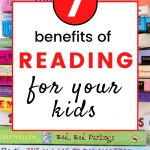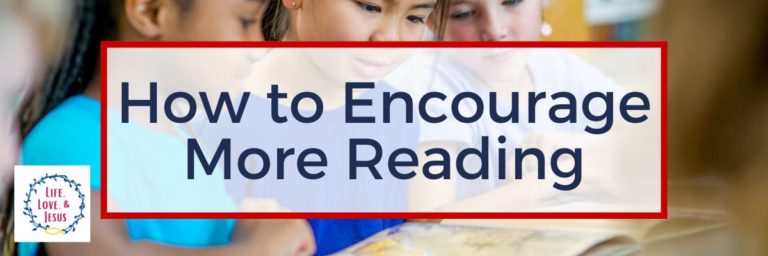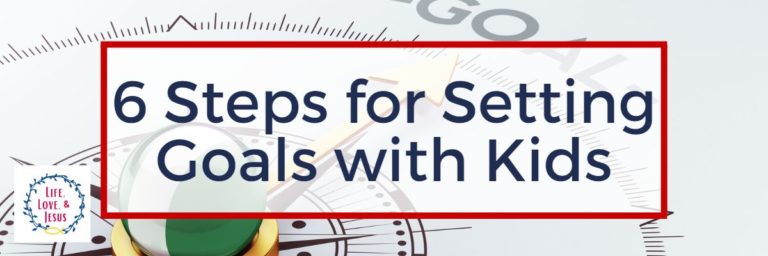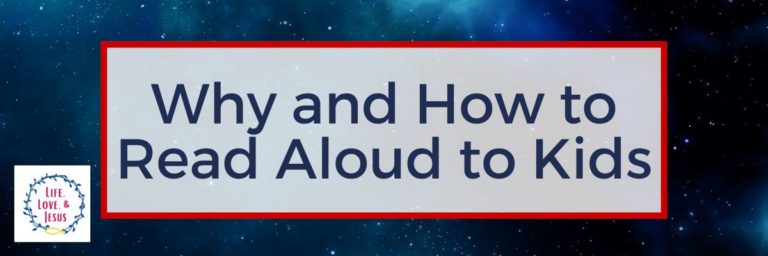7 Benefits of Daily Reading
This post contains affiliate links. If you click & make a purchase, I receive a commission! Thanks! Read my full disclosure policy. As an Amazon Associate, I earn from qualifying purchases.
Why do children need to learn to read? What are the real benefits of daily reading for children outside of managing to graduate from high school (which is, of course, important!)? Is reading just a tool to be used for formal education? Or is it something more?
Short answer: it’s something more. Longer answer: keep reading!

The amount of research that has been done on reading is staggering. Everything from how children learn to read to how the brain functions while reading to how adult readers compare with nonreaders in everything from happiness to job satisfaction.
If there’s a question related to reading that hasn’t been studied, I don’t know what it is!
And that’s a good thing. Because it means we – us non-researcher people – can be confident about why reading matters.
And boy, does it ever matter!
7 Benefits of Reading for Children and Adults
We’ll look at each of these in detail, but first here’s a quick view of 7 top benefits of reading. Some are specific to children, especially in an educational environment. But others are benefits that begin in childhood and continue throughout life, as long as you keep reading.
- Reading increases creativity and imagination
- Reading creates and strengthens connections in the brain
- Reading increases vocabulary knowledge
- Nonfiction reading increases background knowledge
- Reading builds mental stamina
- Reading increases the ability to think, analyze, and draw conclusions
- Reading increases problem-solving abilities
Just one thing to remember as we begin looking at these benefits. This list is not exhaustive. These benefits of reading are important. But there are more benefits of reading for children and adults than can be covered here.
Reading Increases Creativity and Imagination
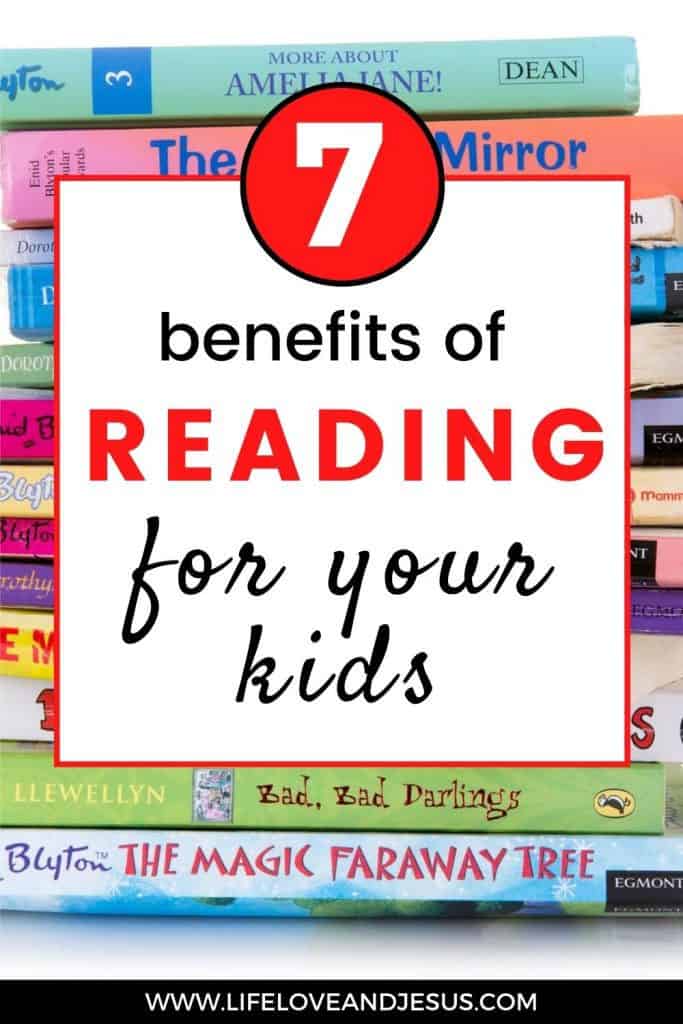
Have you ever watched young children playing? The under-10 crowd used to be reliably creative. Now, creativity in play seems to die off around age 4 or 5. Preschool children will build forts from tents, play with empty boxes, create hiding places behind curtains and under beds, and imagine they are dinosaurs, monsters, and superheroes – all with loud sound effects!
In short, young children are born creative. They have rich imaginations.
So what happens? Why do most children, by the time they reach double-digits, have difficulty writing creative stories, building creative play spaces, or imagining scenes from a book with no pictures?
I believe there are two primary culprits: screens and ‘over-parenting.’ Screens are obvious. When a movie or video provides all the imagery and sound effects, the brain doesn’t have to do any creative work. Solution: screen control.
But what do I mean by over-parenting? See if this list looks like any parents you know:
- Every moment/day/month is programmed with activities
- Children who complain about being bored are given a screen, so they won’t bother mom or dad
- Children are told not to run too fast, climb too high, go too far, or do anything else that might result in skinned knees or broken arms. Of course, you know I’m not saying no guidance or protection is needed. But sometimes the only way to learn and grow is by failing.
- And the learn-by-failing method goes for creativity and imagination also. The child who whines “I can’t…” needs to learn by failing. Learn to draw by drawing lousy pictures. Learn to write by writing lousy stories. (Psst…don’t tell the kids they are lousy!).
It’s in the nothing-to-do, I-can’t times of their lives that creativity and imagination grow. And by reading books. Especially books without any pictures.
Imagination is more important than knowledge. For while knowledge defines all we currently know and understand, imagination points to all we might yet discover and create. -Albert Einstein-
Reading Creates and Strengthens Connections in the Brain
I won’t spend a lot of time here. But the core idea is that the more our brains are used, the more they grow connections and strengthen what we already have.
And reading, because it is hard for the brain, is especially good at this. Reading when there are no pictures is even better because the brain has to create all the images.
Bottom line: read and read more! Psst…audiobooks count in this category!
Reading Increases Vocabulary Knowledge
Lots of research has been done on the importance of vocabulary to educational success. And of course, we know that success in education usually translates into success as an adult – job, home, family, bank account. The conclusion of all those studies: vocabulary is important, very important.
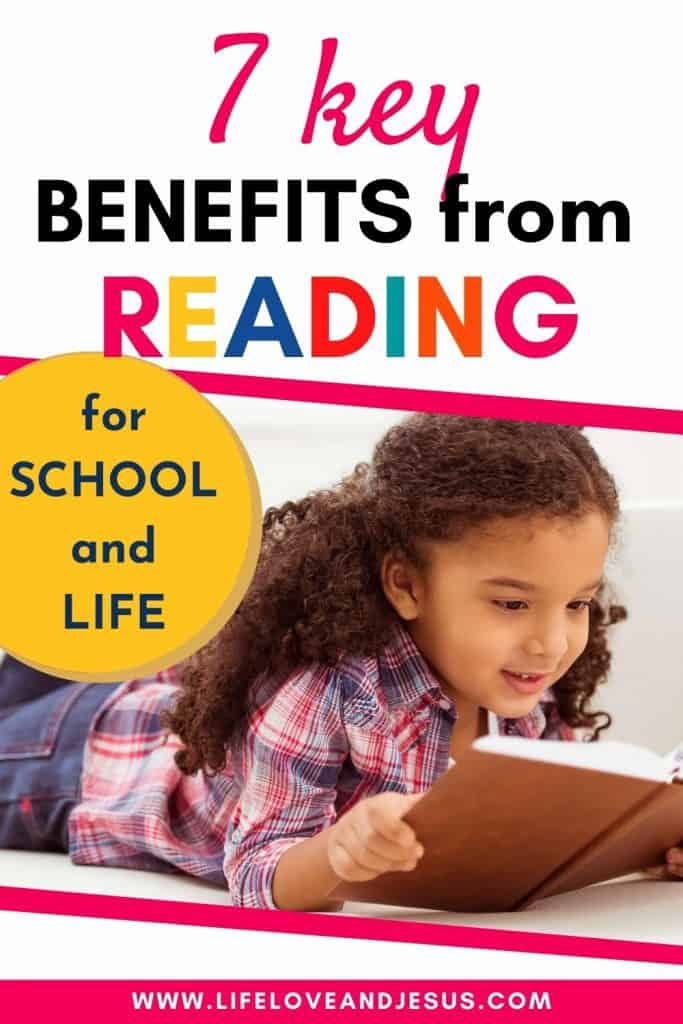
And the best way to increase a child’s vocabulary? You know the answer – reading! Both being read to and reading books on their own play important roles in growing a strong vocabulary.
I want to focus just for a moment on how listening to books can improve your child’s vocabulary. These are the basic facts:
- Children can understand and enjoy books far above their reading ability.
- Those harder books also have more advanced vocabulary.
- When reading a book aloud you do not need to stop at every new or difficult word. Usually, the context of the story will help the listener to understand. The brain – an amazing creation! – will log the memory of that word and the context for future reference.
- When stopping to explain a word makes sense or helps a child understand the story better, do so. But don’t go into a 15-minute vocabulary lesson! Just a 2-second “that means…” is all that is needed.
So read those books!
If you want your children to be intelligent, read them fairy tales. If you want them to be more intelligent, read them more fairy tales. -Albert Einstein-
Nonfiction Reading Increases Background Knowledge
Background knowledge may be a term that you’ve never heard. But you still know what it is. Background knowledge is the information in your brain that tells you, when you read the word “pig” that it means a four-legged animal that lives on a farm, likes the mud, and is raised for meat like pork chops, ribs, and bacon.
You weren’t born knowing that “pig” meant that – you learned it. But I bet you don’t remember learning it! You’ve known it for so long that you ‘just know.’ That’s background knowledge.
And it is critical for success in school. I repeat – it’s critical for success in school.
There are only two ways to gain background knowledge: from experience (you live on a farm with pigs) or from someone else’s experience (they tell you, either in speaking or in writing).
You can see how important reading is to background knowledge. Because no one experiences everything! But everyone needs to understand what basic words mean: mountain, ocean, wheat, apple, ladder, baby, flower, desk, flag, walk, leap, swing, art, paint, and museum. These words mean nothing if you don’t experience them or learn about them through someone else’s experience.
And how do you learn about the ocean if you live thousands of miles from one? Reading. How do you learn about how wheat becomes bread if you aren’t a farmer or baker? Reading. How do you know where Europe and India are if you don’t live there? Reading.
Background knowledge is learning as much as possible about the world we live in. And the best way to build it? Reading. Specifically – reading lots of different types of books. More about that in a future post.
Reading Builds Mental Stamina
Mental stamina is the ability to stick to an activity that taxes your brain even when giving up is easier.
Mental stamina is the difference between starting a book and finishing one. It is the difference between reading for 3 minutes and reading for 30 minutes. It is the difference between those who start a 4-year degree program but drop out and those who finish.
Mental stamina is often the difference between success and failure.
So when your child complains that he doesn’t want to read tonight or that her book is too long or that the words are too hard or that 5 minutes of reading is just as good as 20 minutes – hold your ground and don’t give in no matter how much they whine!
They may never thank you; they may claim they hate you. That’s sometimes the cost of doing what’s best for your kids instead of what’s easy.
Reading Increases the Ability to Think, Analyze, and Draw Conclusions
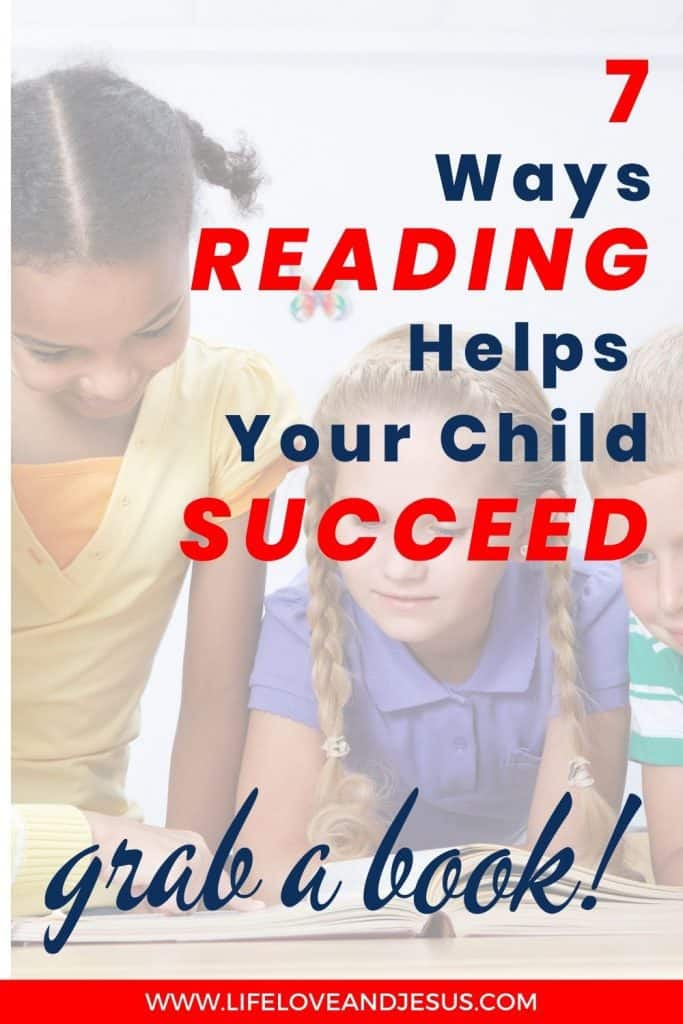
Closely related to mental stamina is your child’s ability to think clearly, reason logically, support their opinions, and not be spoon-fed conclusions or beliefs. Reading paves the way for developing these skills.
Instead, he will be able to find the information he needs and evaluate whether the information is reliable.
She will be able to think critically about what an author writes and determine if the argument is supported by facts.
He will be able to recognize the difference between opinion and fact, truth and fantasy, exaggeration and lying. These skills and many more like them will be crucial to thriving in the 21st-century world.
Reading Increases Problem-solving Abilities
Right along with thinking and drawing conclusions, reading prepares the brain for learning to solve problems.
Think for a moment about one of the most popular types of books (and movies or TV for that matter): the mystery or who-done-it. What is your brain doing while reading? Trying to solve the mystery. Looking for clues. Rereading something that might be important. Looking for suspects. Deciding who didn’t do it.
All of these skills – employed without conscious effort – are problem-solving skills. And your child needs to be a problem-solver to thrive in life.
Some problems he or she will face in life include:
- What career should I pursue?
- What job should I apply for?
- How do I best sell myself to the interviewer?
- How do I make my money stretch to the next paycheck?
- How can I save enough money to buy a house?
- Where should I invest for my retirement?
- Is it better to say yes to my boss’s ideas or share what I think are better solutions?
- How can I repair my spouse’s hurt feelings?
And so much more! Problem-solving skills are a must-have in life. Reading helps develop those skills.
Now What?
I bet you know what I’m going to say! Get a few books for yourself and your children. Then start reading. Every day. You read. They read. Make it a family tradition. For 20 minutes every day after dinner, everyone in the family takes out a book (or magazine – no screens!) and reads.
When your children master reading skills and when they learn to love reading they will be leaps and bounds ahead of those that don’t know how to read and those who know how to read but don’t.
The world has changed so much in your lifetime. Imagine how much it will change in your children’s lives. The only way to keep up is to keep learning. And the only way to keep learning is to keep reading.
Plus – they can take a vacation in their mind just by picking up a book!

